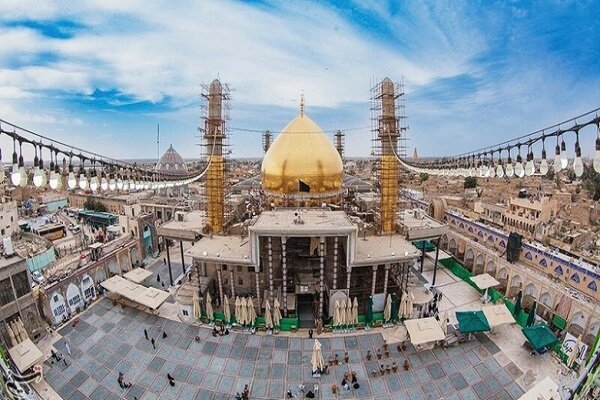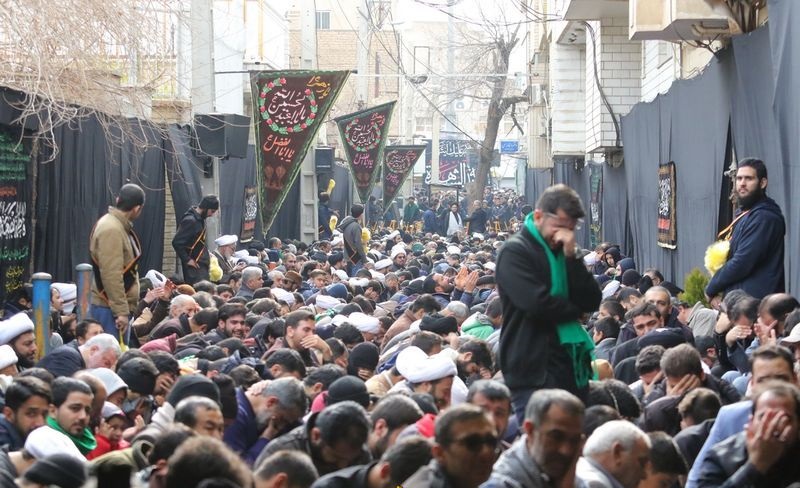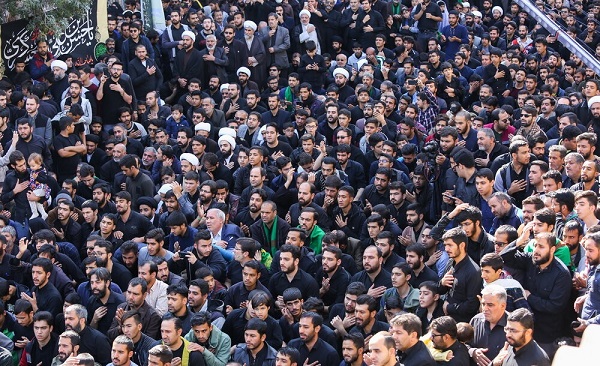Thus, it is clear that without a divine guide in society, even the most knowledgeable persons are at risk of falling into error, let alone those who masqueraded as caliphs and usurped the political rights of the Ahl al-Bayt through treachery, deceit, spurious committees, forced wills in their favour, and by resorting to the sword.
Imam Hassan al-Askari was born in Madina,on 8th day of the month of Rabi Thani, in the year 232 A.H. He was called al-Askari in connection with the district of Askar in the city of Samarra in which he (the Imam) and his father, Imam Ali un-Naqi al-Hadi (AS) were imprisoned by the Abbasid caliphs.
In Iran, black-clad faithful gather in mosques, places of worship and religious sites to listen to eulogies delivered in honor of the revered figure. On this day, families and households prepare food, known as Nazri, for others as a way of almsgiving. The preparation and the partaking of this food are considered a privilege by believers.
However, this year due to the outbreak of the novel coronavirus pandemic ceremonies are different as large gatherings have been banned.




Imam Hasan al-Askari (PBUH) was 11th in the line of the 12 Successors so explicitly spelled out by the Prophet in several hadith. That was the real reason of despair for the caliph, who murdered the Imam in the prime of his youth, since the Prophet had made it clear that his 12th descendant will rise as Qa'em al-Mahdi (AS) to cleanse the world of all vestiges of oppression and corruption and to establish the global government of peace, prosperity, and justice.
These ideas were anathema, not just for Mo'tamed but to all his predecessors because of their corrupt and oppressive nature that had tarnished the image of Islam beyond recognition and split Muslims into sects and groups.
No wonder, Prophet Muhammad (SAWA) had emphasized in the famous Hadith Thaqalayn regarding the prime position of the holy Qur'an and the Infallible Ahl al-Bayt: "Hold fast to them and you will never go astray, for the two never separate with each other, even when they return to me at the Pool (Kowthar on the Day of Judgement)."
The Rasekhouna fil-Ilm (firmly grounded in esoteric knowledge) – to use the Qur'anic term in the honour of the Imams – were the divinely-decreed vicegerents of Prophet Muhammad (SAWA) on earth.
In other words, neither imprisonment could hamper their mission nor could martyrdom. Imam Askari (AS) in his brief period of spiritual leadership of the ummah, in between the bouts of imprisonment to which he was subjected or held under house arrests, expounded to the faithful the true meaning of the holy Qur'an.
There is a Tafsir or Exegesis of part of the Book of God attributed to him, as part of his explanation of divine ayahs to a group of youngsters that had visited him in Samarra from distant Khorasan. In addition, the 11th Imam's knowledge of the heavenly scripture is also evident in the books that were written by his disciples.
Another proof of his God-given authority was his message to the Philosopher of the Arabs, Ya'qoub bin Ishaq al-Kindi, through one of his disciples that finally dissuaded the so-called rationalist from writing a blasphemous work on the holy Qur'an. Al-Kindi, realizing the wisdom of Imam Askari's (AS) words that what had come to his philosophical mind was not necessarily correct since there are other vistas of knowledge well outside the scope of fallible brains, burned the blasphemous book he was writing.
Thus, it is clear that without a divine guide in society, even the most knowledgeable persons are at risk of falling into error, let alone those who masqueraded as caliphs and usurped the political rights of the Ahl al-Bayt through treachery, deceit, spurious committees, forced wills in their favour, and by resorting to the sword.
* (The contenets of the article are extracted from Iran's Young Jounalist Clubs website and imamreza.net)
To read the original articles, visit the following links:
https://www.yjc.ir/en/news/48905/martyrdom-anniversary-of-imam-hasan-al-askari-as
imamreza.net/old/eng/imamreza.php?id=8928